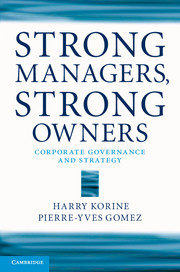Gouvernance | Page 35
autres publications Gouvernance Nouvelles diverses
Strong managers, strong owners : un ouvrage pour cet été ?
Ivan Tchotourian 28 juillet 2016
Harry Korine et Pierre-Yves Gomez ont publié un ouvrage qui vient de rejoindre ma bibliothèque : « Strong Managers, Strong Owners: Corporate Governance and Strategy » (Cambridge University Press, décembre 2013).
The family firm preparing generational change, the partnership that welcomes new partners, and the shareholders of a firm that chooses to go public are making decisions that will have an impact on strategy and management. Conversely, a change in strategy such as a move to diversify or a decision to take on more risk in a business can make the firm more attractive to some shareholders and less attractive to others and is therefore not ownership neutral. Opening the black box of agency theory, Korine and Gomez show how management and ownership interact to shape the strategy of the firm. In their view, the critical question to ask is not what is the best strategy, but rather, who is the strategy for? With numerous detailed examples, Strong Managers, Strong Owners is an invaluable resource for company owners, board members and executives, as well as their advisors in strategy and governance.
Voici la table des matières :
Part I. Changes in the Identity of Ownership and Management:
1. Change in ownership
2. Change in management
Concluding remarks
Part II. Changes in the Form of Ownership and Organization:
3. Change of legal structure
4. Change of organizational structure
Concluding remarks
Part III. Changes in Strategy:
5. Corporate and business strategies
6. Despite failure, NO change in ownership, management, or strategy
7. Because of success, reinforcement of ownership, management, and strategy
Concluding remarks
Part IV. Implications for Corporate Governance:
8. The board of directors
Conclusion – strategy for whom?
À la prochaine…
Ivan Tchotourian
autres publications mission et composition du conseil d'administration Normes d'encadrement Nouvelles diverses place des salariés
Système allemand de codétermination : un modèle exportable ?
Ivan Tchotourian 22 juillet 2016
Alors que Theresa May a fait part de son intérêt d’importer en Grande-Bretagne le système allemand, MM. Horst Eidenmüller, Mathias Habersack, Caspar Behme et Lars Klöhn reviennent sur la pertinence de cette proposition en jetant un regard prudent (de chercheurs !) sur ce système : « Corporate Co-Determination German-Style as a Model for the UK? » (18 juillet 2016).
On 13 July 2016, Theresa May took up office as Prime Minister of the United Kingdom. Only shortly before, she had made headlines when she proposed to adopt European-style worker representation on the boards of leading companies.
Corporate co-determination hence seems to gain a certain degree of popularity with the British government – which is highly astonishing, considering that it was the UK which most fiercely fought against co-determination on a European level. It was mainly the diverging views of the UK and Germany on co-determination which have thwarted projects like the Draft Fifth Company Law Directive or the establishment of a European Private Company (Societas Privata Europaea, SPE). It is downright ironic that while the UK now shows an interest in co-determination, the concept is being questioned in Germany after decades of lying dormant. The reason for the new German discussion of co-determination are doubts regarding the compatibility of its specific form of co-determination with higher-ranking Union law. This post provides a brief overview of the most recent developments in German co-determination law that were the focus of a joint Oxford/Munich conference at the Ludwig-Maximilians-Universität (LMU) in Munich in March 2016.
À la prochaine…
Ivan Tchotourian
engagement et activisme actionnarial Gouvernance Nouvelles diverses
Le Japon à l’heure d’une gouvernance nord-américaine
Ivan Tchotourian 20 juillet 2016
Les entreprises japonaises feraient-elles l’objet d’une gouvernance de type anglo-américaine ? C’est ce qu’il semble à la lecture de cet article : « Shareholders put Japan’s corporate governance to the test » (Nikkei Asian Review, 25 juin 2016).
Voici quelques extraits :
Many stockholders at security company Secom’s annual meeting Friday demanded explanations over why then-Chairman Shuji Maeda and then-President Hiroshi Ito were fired in May, despite the company’s strong performance last fiscal year. (…) Secom voluntarily created an executive nomination and compensation committee, but has not made the members’ names public. Attendees raised questions over the effectiveness of the company’s governance structure. « There’s still room for improvement in the selection process for executives, » one said.
Shareholders at Mitsubishi Chemical Holdings’ meeting the same day focused on earnings power and dividends. The chemical company had logged extraordinary losses from restructuring its petrochemical business, while return on equity fell under 5% for the year ended in March. Shareholders demanded more details over the loss, and urged the company to try to raise its stock price. (…)
Kobe Steel logged a group net loss last fiscal year, and its ROE has long remained low. Just 87.3% of shareholders voted for the proposal to retain Chairman and President Hiroya Kawasaki, down 8 percentage points from last year. (…)
Toshiba came under harsh criticism at its Wednesday meeting, with shareholders blaming the company’s top-down culture and the lack of independence at its accounting department for its bookkeeping scandal. Only 87.06% of shareholders voted to reappoint President Satoshi Tsunakawa,
À la prochaine…
Ivan Tchotourian
Gouvernance Nouvelles diverses
Capsule-vidéo sur la RSE (par Bruno Dondero)
Ivan Tchotourian 18 juin 2016
Bonjour à toutes et à tous, je signale cette excellente capsule-vidéo de mon collègue Bruno Dondero (Université Paris I Panthéon-Sorbonne). Celle-ci porte sur la responsabilité sociale des entreprises et constitue une belle synthèse de la notion.
Cette vidéo fait partie du dispositif pédagogique du MOOC Sorbonne Droit des entreprises, qui a connu sa première session entre mai et juin 2014 sur la plate-forme France Université Numérique (FUN).
Ces vidéos peuvent être utilisées, ensemble ou de manière séparée, pour servir de support ou de complément à un cours de droit des affaires, de niveau universitaire (Licence, Master) ou autre.
À la prochaine…
Ivan Tchotourian
autres publications devoirs des administrateurs Gouvernance normes de droit Nouvelles diverses
Publication au Bulletin Joly Bourse : retour sur Theratechnologies
Ivan Tchotourian 7 juin 2016
Bonjour à toutes et à tous, je viens de publier au Bulletin Joly Bourse une analyse de la décision de la Cour suprême Theratechnologies inc. c. 121851 Canada inc. (2015 CSC 18). Sous le titre « Responsabilité civile sur le marché secondaire : premières précisions de la Cour suprême canadienne sur l’autorisation judiciaire préalable », je reviens sur les enseignements de cette importante décision d’avril 2015 en termes de protection des investisseurs par le biais des recours collectifs.
Rendue le 17 avril 2015, la décision de la Cour suprême canadienne Theratechnologies inc. c. 121851 Canada inc. apporte des précisions intéressantes sur le régime de responsabilité de nature civile relevant du droit des valeurs mobilières. Au travers de cet arrêt, la plus haute instance du pays se prononce pour la première fois sur les conditions d’autorisation de ce recours introduit en 2007.
À la prochaine…
Ivan Tchotourian
engagement et activisme actionnarial Nouvelles diverses
ExxonMobil v. changement climatique
Ivan Tchotourian 26 mai 2016
Dans un article de Le Devoir daté d’aujourd’hui (par François Desjardins), j’apprends que l’entreprise ExxonMobil a résisté à l’assaut des actionnaires pro-climat : « La proposition sur la mesure du risque carbone a été battue ».
Faute d’appuis suffisants, il n’y aura pas d’analyse pour l’instant : 38 % des actionnaires d’ExxonMobil et 41 % de ceux de Chevron ont appuyé mercredi des résolutions demandant à la direction d’évaluer l’impact qu’auront les politiques en matières de lutte contre les changements climatiques sur la viabilité des activités.
(…) Par ailleurs, 18,5 % des actionnaires ont voulu forcer l’entreprise à appuyer explicitement l’importance de l’objectif de 2 degrés et 21 % voudraient qu’un expert climatique soit nommé au conseil.
(…) La seule résolution qui a obtenu une majorité de votes est celle permettant à des actionnaires minoritaires de mettre en nomination des candidats souhaitant accéder au conseil, ce qui pourrait ouvrir une fenêtre à des personnes issues du mouvement environnemental. Le conseil d’ExxonMobil avait recommandé à ses actionnaires de rejeter toutes les propositions.
L’entreprise américaine devrait tout de même se méfier comme je l’ai exprimé sur le blogue Contact : « Entreprises et défi climatique: la fin d’une ère? ». Le désinvestissement est une menace plus que devenue sérieuse…
Voilà que l’actualité récente rend compte d’une tendance qui prend de plus en plus d’ampleur. Initiative discrète, lancée au départ par des étudiants américains, elle gagne désormais du terrain. Organisations, entreprises, financiers, individus… même l’acteur et militant Leonardo DiCaprio a joint ce mouvement à la fin septembre! De quelle tendance s’agit-il? Du développement d’une campagne de désinvestissement des énergies fossiles.
À la prochaine…
Ivan Tchotourian
mission et composition du conseil d'administration Nouvelles diverses
Mauvaise conduite du P-DG : quelle réponse du CA ?
Ivan Tchotourian 18 mai 2016
« How should the board respond when a ceo’s bad behavior makes the news? », c’est sous ce titre que David Larcker et Brian Tayan propos une analyse sur le « comment » un CA réagit aux mauvaises nouvelles induites par la mauvaise conduite d’un P-DG
Corporations engage in a variety of responses to allegations of CEO misconduct. The most common is a press release or formal statement on the matter. This occurred 84 percent of the time. In 71 percent of cases, a spokesperson provided direct commentary to the press. Board members were much less likely to speak to the media, making direct comments only 37 percent of the time. In over half of cases (55 percent), the board of directors was known to initiate an independent review or investigation. The board is most likely to announce an independent review in cases of potential financial misconduct. However, the willingness of an individual director to discuss the matter directly with the press does not appear to be associated with the type of behavior involved or the “severity” of the CEO’s actions”.
À la prochaine…
Ivan Tchotourian

